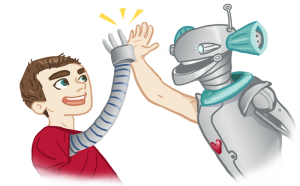 January 9th marked the 129th birthday of Karel Capek, the Czech science fiction writer who first decided to use the word “robot” to describe the mechanical marvels that have become commonplace in both media and our everyday lives. Although we focus on philosophy for kids, we’ve got a soft spot for robots, especially our very own Phil. It may seem like a strange combination, the big questions that humans have been asking for thousands of years and machines that don’t really think for themselves, but for a wee philosopher, there’s actually a lot to be gained from bringing the two together.
January 9th marked the 129th birthday of Karel Capek, the Czech science fiction writer who first decided to use the word “robot” to describe the mechanical marvels that have become commonplace in both media and our everyday lives. Although we focus on philosophy for kids, we’ve got a soft spot for robots, especially our very own Phil. It may seem like a strange combination, the big questions that humans have been asking for thousands of years and machines that don’t really think for themselves, but for a wee philosopher, there’s actually a lot to be gained from bringing the two together.

Robots (or at least the idea of them), have been fascinating thinkers for more than two thousand years, because of what they are, what they can do, and what they represent for us as humans. If you’ve got a little thinker who’s fascinated with robots, there are all kinds of questions that can spark some amazing conversations, and encourage critical, creative thought. Here are some examples:
- Is it possible for a human to become a robot, or for a robot to become a human? What would have to change in order to make the switch? Would you want to become a robot?
- Why do we seem to think robots should look like humans (when so few real robots actually do)? Why do robots in movies, comics, and TV shows look like people? Does the way something looks change the way we feel about it?
- Which jobs would we like robots to do, and which jobs would we like to do ourselves? Is work more or less important when a robot does it? Why?
- Can robots make art, like humans do? If we teach a robot to use a paint brush and crayons, would the things they create still be art? Why or why not?
- When a robot does something wrong, do we blame the robot or someone/something else? Why is that?
- Can you have a robot as a best friend? Why or why not?
- Do we feel the same way about other machines as we do about robots? Why or why not?

Pretty cool, right? These questions are really fun on their own, but they’re even better when accompanied by a favourite robot book or comic, or a robot-related building or craft project. Talking about robots is a fascinating way to encourage a child to think deeply about themselves, other people, and the world around them. Give it a try!
Also, check out our video series on fun facts about robots!
